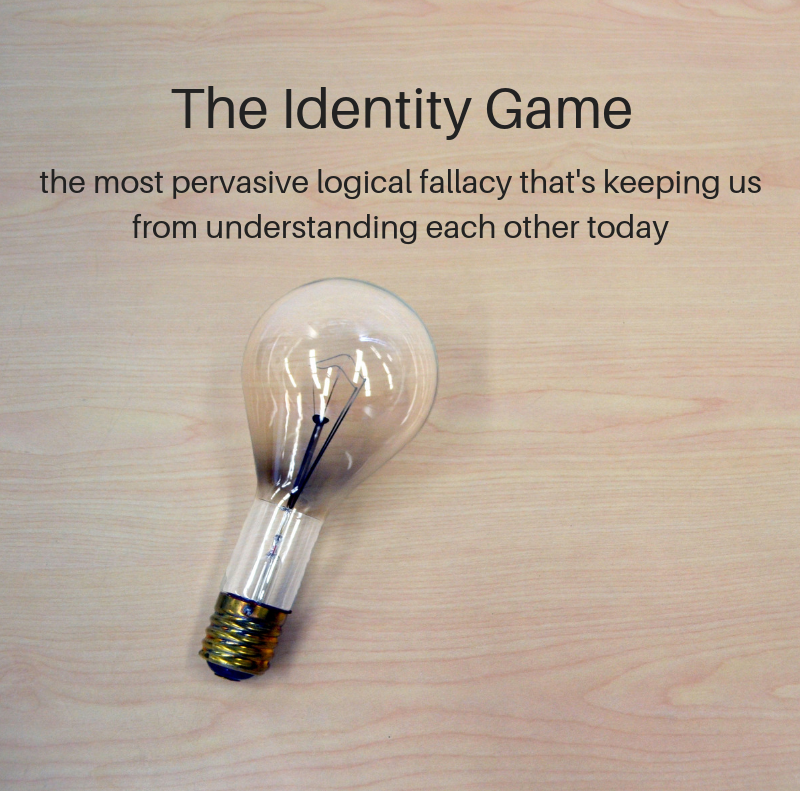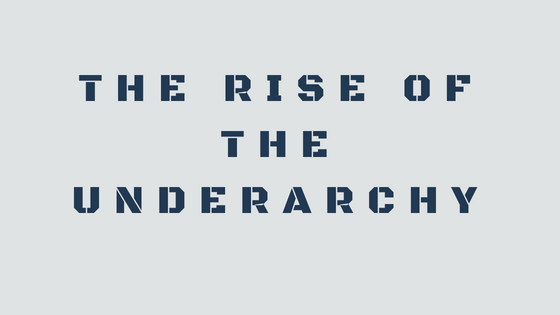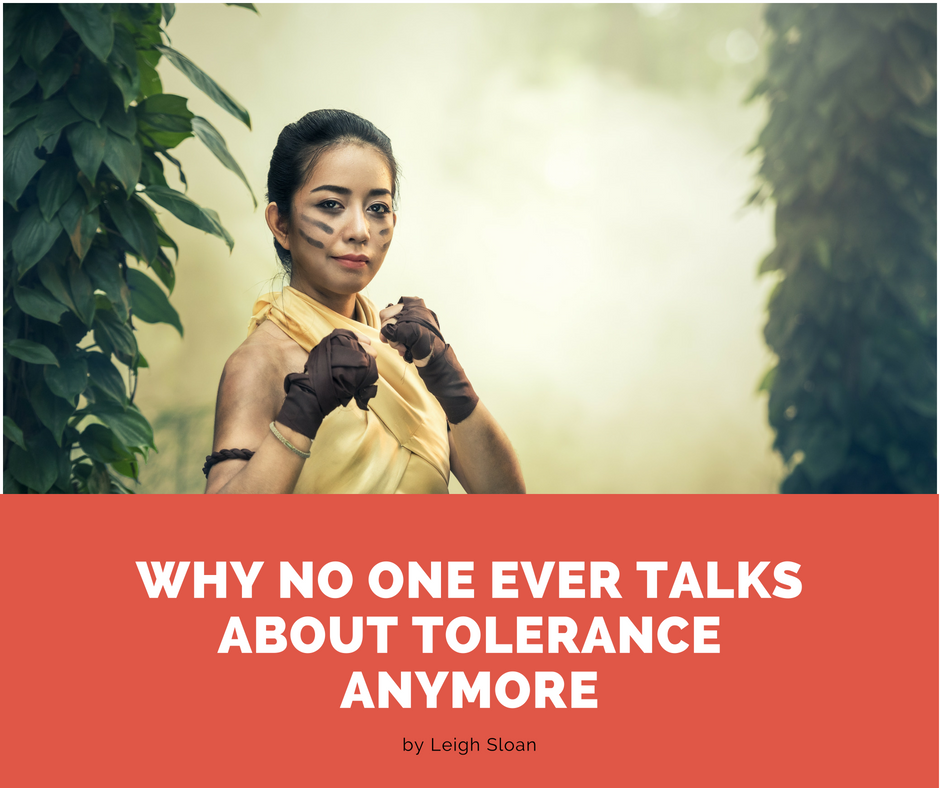If you’ve ever studied the art of argument, you’ll know that there are very specific ways we get it wrong when we engage in an argument. There are specific ways that our logic becomes, all of a sudden, not so logical. Among these are the fallacies of ad hominem (or being a jerk and name calling), straw man (mischaracterizing the opposite side), slippery slope (assuming that one thing will necessarily lead to another and another), circular argument (this one baffles me in that it seems to ignore all logic), or the red herring tactic (What I like to call the “Squirrel!” tactic. It’s the art of distraction from the issue at hand by drawing attention to something else.) There are many of these, but the one I see most often in society has not been articulated clearly enough in my opinion. You could make the case that one of the other 6-15 fallacies covers it, but for the sake of clarity, I suggest on giving this one a category all its own.
I’m going to call this the “identity fallacy.” You may know where I’m going with this. You may have heard the phrase “identity politics.” It is mostly used by moderates and right leaning people to disparage what I think of as the identity fallacy. Even though people who are concerned about this have a right to be concerned, I think we have some work to do in defining the issue. We have a tendency in today’s culture to just slap a label on something when it feels out of bounds without using logic to underpin what we are doing. Not clearly defining terms allows us to maintain our hypocrisy because we cannot effectively judge ourselves by the same standards if we don’t know what those standards are.
I see both people on the right and left and in between committing this identity fallacy. Let me explain now what I mean.
In this new millennium, we are less focused on facts and figures and more and more interested in stories. This is not a bad thing altogether. It helps us understand each other in a more culturally diverse society. If you know the stories of another person, it’s a great way to quickly and effectively understand them. So, while this may be a good practice for enriching the fabric of society, it can cause a logical breakdown in our ability to reason and argue effectively.
As our culture gets more interested in cultural differences, we can tend to judge everything that comes out of that persons mouth through the lens of their most obvious characteristic. After all, we are accustomed to reading the opinions of people we’ve never met over social media. Rather than chatting with the guy down the street and becoming familiar with his particular story, we have to make assumptions about people from what we see. The first thing we see is the color of someone’s skin or that person’s physical attributes. We see the type of clothing that they wear. We hear the type of language coming out of their mouths and the accent with which they speak. Then we make assumptions about his or her (or some androgynous “them”) based on all of these assumptions. I’ve written before on the caution against labels and assumptions, and I think we are all aware of those to one degree or another. But how do we break the wrongheaded cycle of assumption when we have no mechanism to catch ourselves in the fallacy of it?
Let me first define the identity fallacy. Any time someone takes into account the personal attributes of the person who is making the statement to judge the validity of the statement, that is an identity fallacy. To be sure, The practice of jumping to conclusions about what a person says based on what we know about them is actually helpful in our everyday lives. I mean it’s natural and even wise not to put a lot of stock into what someone says if we don’t trust them or if they have less knowledge about a topic, etc. However, in a logical argument, the person’s background has nothing to do with the truth value of what they are saying.
We pride ourselves on the pursuit of equity in our nation. Just think about how much the principles of logic contribute to this sense of equality. Any person (young/old, rich/poor, famous/unknown) should be able to come to the table of conversation with something valuable to offer. But these wonderful ideals begin to break down when we engage in the identity fallacy.
Let me start with race. As of late, there have been some brave African American individuals who have said some things that have questioned the stereotypical views of their culture. We all are well aware that there are things that a black person can say that a white person cannot. The fact that this is true is evidence that we have an epidemic of this identity fallacy.
Take sexual orientation or gender expression, or take income levels. We know that people who have a more traditional expression feel that they have very little voice to speak into issues of sexual identity. Those with more money feel that they cannot speak to issues of poverty (at least not out loud). We are finding ourselves with a soft cultural form of censorship. We are censoring ourselves out of fear of being disqualified and judged according to our outward identity. And by doing this, we are having weaker and fewer conversations.
You’ve seen evidence of the identity fallacy on those “gotcha” videos in which statements from Hitler’s speeches were attributed to Donald Trump or Hillary Clinton. Depending on the person’s politics and who they thought said it, they would praise whatever was said without really stopping to consider the logic or thought process behind what was being said.
On the right, people may be silenced for not knowing anything because of their youth or their lack of experience and so we stop listening. On the left, people are silenced because they are not a member of the oppressed population. On the right we stop listening to a person because they are “entrenched in politics.” On the left we stop listening because a person has been irrevocably labeled as some kind of “—phobe.”
In days of old, our labels may have looked different. They may have been slave and freeman, aristocrat or commoner, clergy or layperson. We think we are more sophisticated now. Now we prize ourselves on a sophisticated web of terms that we lay one over the other, to describe one another. And as I said, these have some value. But when engaging in a logical argument, we need to work hard to put these aside. Laziness will cause us to always shift toward a more identity oriented approach, but this will lead us down a path that leads to more and more ignorance, fewer and fewer productive conversations, and ultimately toward less and less understanding.
The easiest way to test how much you are being influenced by identity is to ask yourself, “What would I think if this argument/logic was coming out of another person’s mouth?” What type of person would have to say this in order to make me okay with this? If your answer changes based on the identity of the speaker, you need to question the way that you come to conclusions. You may have an identity paradigm that needs to shift. You never know when the wisest insight you need in the moment may come out of the mouth of a person that you may at first reject by simple virtue of their identity.
What is more important to you, who said it or what is said?





